八年级英语下册第4单元知识点和练习
2020年春人教新目标英语八年级下册unit4-知识点分析与练习(无答案)
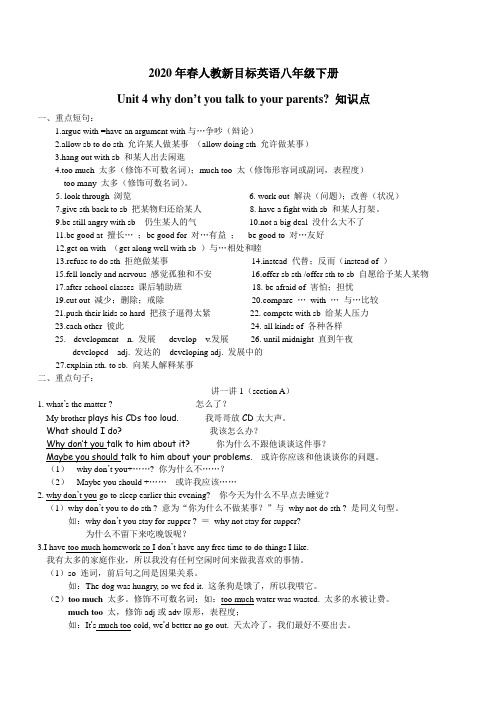
2020年春人教新目标英语八年级下册Unit 4 why don’t you talk to your parents? 知识点一、重点短句:1.argue with =have an argument with与…争吵(辩论)2.allow sb to do sth 允许某人做某事(allow doing sth 允许做某事)3.hang out with sb 和某人出去闲逛4.too much 太多(修饰不可数名词);much too 太(修饰形容词或副词,表程度)too many 太多(修饰可数名词)。
5. look through 浏览6. work out 解决(问题);改善(状况)7.give sth back to sb 把某物归还给某人8. have a fight with sb 和某人打架。
9.be still angry with sb 仍生某人的气10.not a big deal 没什么大不了11.be good at 擅长…;be good for 对…有益;be good to 对…友好12.get on with (get along well with sb )与…相处和睦13.refuse to do sth 拒绝做某事14.instead 代替;反而(instead of )15.fell lonely and nervous 感觉孤独和不安16.offer sb sth /offer sth to sb 自愿给予某人某物17.after-school classes 课后辅助班18. be afraid of 害怕;担忧19.cut out 减少;删除;戒除pare …with …与…比较21.push their kids so hard 把孩子逼得太紧22. compete with sb 给某人压力23.each other 彼此24. all kinds of 各种各样25.development n. 发展develop v.发展26. until midnight 直到午夜developed adj. 发达的developing adj. 发展中的27.explain sth. to sb. 向某人解释某事二、重点句子:讲一讲1(section A)1. what’s the matter ? 怎么了?My brother plays his CDs too loud. 我哥哥放CD太大声。
人教版英语八年级下册 Unit4知识点梳理和配套练习(无答案)

U4知识点梳理及配套练习语法点睛【例句】1. Why don’t you call him up to say sorry?= Why not call him up to say sorry?为什么不给他打电话道歉呢?2. You should tell your parents your real thoughts.你应该把你的真实想法告诉你的父母。
3. — Lisa is angry with me. What should I do?Lisa 在生我的气。
我应该做什么?— You could buy a gift for her.你不妨给她买个礼物。
4. What about having a surprise party for Tom?= How about having a surprise party for Tom?给汤姆办一个惊喜派对怎么样?5. Shall we go to the beach this weekend?这周末我们去海滩好吗?6. Let’s go to the old people’s home tomorrow.明天我们去敬老院吧。
【总结】※“Why not+ v.+ ...?”为省略句,其完整句式为“Why don’t you (we) + 动词原形+ 其他?”意为“为什么不……呢?”,常用于间接地向对方提出建议,往往带有肯定意味,一般不必回答,如例句1。
※“Sb should + v.+ ...”意为“你应该……”,用以表示劝告或推荐,如例句2。
※“Sb could + v.+ ...”意为“你不妨……”,其中could 并不是can 的过去式,而是更委婉地提出建议,如例句3。
※“What / How about + 名词/ 代词/ v.-ing 形式+ ...?”意为“……怎么样?”,是提建议或征求对方意见的委婉说法,如例句4。
※“Shall we / I + v. + ...?”意为“我们/ 我……好吗?”,常以商量的语气向对方提出建议,如例句5。
八年级下册英语第四单元知识点总结

八年级下册英语第四单元知识点总结本文将对八年级下册英语第四单元所涉及的知识点进行总结,以帮助同学们更好地掌握课程内容。
Unit 4 Friendship本单元主要围绕“友谊”这一主题展开。
以下是本单元的重点知识点。
Vocabulary单词是语言学习和应用的基础,因此单词的掌握十分关键。
本单元中的重点单词如下:•alienate:使疏远•bond:紧密联系•clique:小圈子•companion:伙伴•dispute:争执•jealousy:妒忌•loyalty:忠诚Phrases and expressions在应用英语时,除了单词外,常用的短语和表达方式也是非常重要的。
以下是本单元中的一些重点短语和表达方式。
•get together:聚会•hang out with:与…出去玩•have a lot in common:有很多共同点•keep in touch:保持联系•lose touch with:失去联系•patch up:和解•stand up for:维护(某人的权利)Grammar本单元的语法重点是过去完成进行时。
过去完成进行时是过去完成时和进行时的结合。
它表示过去某个时间开始做某事,并持续了一段时间,但在另一个时间已经停止。
例如:•He had been studying for three hours when his mother called him for dinner.(当妈妈喊他吃晚饭的时候,他已经学习了三个小时了。
)在这个例子中,动词“study”使用了过去完成进行时。
Reading本单元的阅读材料是一篇题为“Making Friends”的文章,讲述了交朋友的一些技巧和注意事项。
在阅读时,注意理解下列短语的含义:•come across:偶然遇见•at ease:放松,自在•take an interest in:对…感兴趣•put oneself out:麻烦自己•break the ice:消除隔阂•hit it off:一拍即合Writing本单元的写作任务是写一篇关于“交友”的文章。
译林版八年级下册英语Unit 4 Reading知识点及练习(含答案)

青少年应如何正确使用手机演讲稿尊敬的老师、亲爱的同学们:
大家好!今天我想和大家谈谈一个现代青少年都面临的问题——手机的正确使用。
手机作为一种现代科技产品,已经成为我们生活中不可或缺的一部分。
但是,正确使用手机却是一个需要我们认真思考和努力实践的问题。
首先,手机的正确使用需要我们明确它的作用和限制。
手机作为一种通讯工具,可以帮助我们与家人、朋友保持联系,获取信息和知识。
但是,它并不是生活的全部。
我们不能沉迷于手机,忽略了身边的人和事。
我们要学会控制使用手机的时间,合理安排生活和学习,不能让手机成为我们的负担和累赘。
其次,正确使用手机需要我们保护个人隐私和信息安全。
在使用手机的过程中,我们要注意保护个人隐私,不要随意泄露自己的个人信息。
同时,我们也要加强手机信息安全意识,不要随意下载不明来源的软件和点击不明链接,以免给自己带来不必要的麻烦和损失。
最后,正确使用手机需要我们遵守社会公德和法律法规。
在使用手机的过程中,我们要尊重他人,不要在公共场合大声喧哗或打电话,不要在课堂上偷偷玩手机。
同时,我们也要遵守网络道德和法律法规,不要传播不良信息、违法信息,不要参与网络欺凌和网络暴力行为。
总之,正确使用手机是我们每个青少年都应该认真思考和努力实践的问题。
我们要明确手机的作用和限制,保护个人隐私和信息安全,遵守社会公德和法律法规。
只有这样,我们才能充分发挥手机的作用,让它成为我们生活和学习的助手,而不是我们的累赘和负担。
谢谢大家!。
人教版八年级下册英语第四单元基础知识单词、短语、句子专题练习
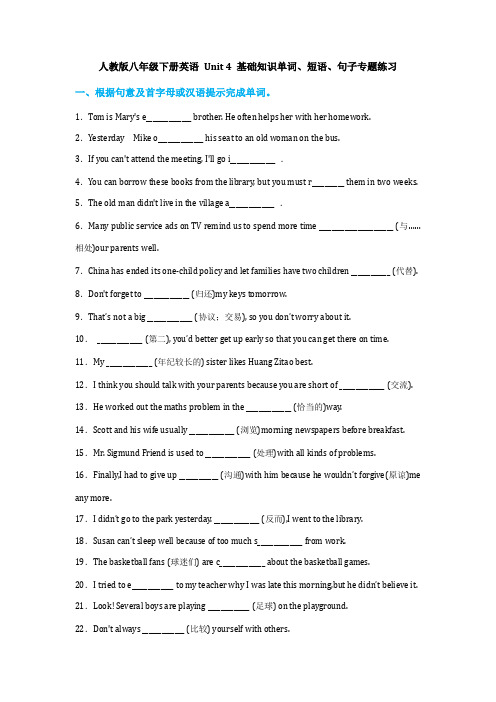
人教版八年级下册英语Unit 4 基础知识单词、短语、句子专题练习一、根据句意及首字母或汉语提示完成单词。
1.Tom is Mary's e______________ brother. He often helps her with her homework. 2.Yesterday Mike o______________ his seat to an old woman on the bus.3.If you can't attend the meeting, I'll go i______________ .4.You can borrow these books from the library, but you must r__________ them in two weeks. 5.The old man didn't live in the village a______________ .6.Many public service ads on TV remind us to spend more time _______________________ (与……相处)our parents well.7.China has ended its one-child policy and let families have two children ____________ (代替). 8.Don't forget to ______________ (归还)my keys tomorrow.9.That’s not a big ______________ (协议;交易), so you don’t worry about it.10.______________ (第二), you’d better get up early so that you can get there on time. 11.My ______________ (年纪较长的) sister likes Huang Zitao best.12.I think you should talk with your parents because you are short of ______________ (交流). 13.He worked out the maths problem in the ______________ (恰当的)way.14.Scott and his wife usually ______________ (浏览)morning newspapers before breakfast. 15.Mr. Sigmund Friend is used to ______________ (处理)with all kinds of problems. 16.Finally,I had to give up ____________ (沟通)with him because he wouldn’t forgive(原谅)me any more.17.I didn’t go to the park yesterday. ______________ (反而),I went to the library.18.Susan can’t sleep well because of too much s______________ from work.19.The basketball fans (球迷们) are c______________ about the basketball games.20.I tried to e_____________ to my teacher why I was late this morning,but he didn’t believe it. 21.Look! Several boys are playing _____________ (足球) on the playground.22.Don't always _____________ (比较) yourself with others.23.We will _____________ (造成) less pollution if we can find ways to reuse or recycle more rubbish.24.I was not good at writing. My English teacher told me some writing _____________ (技巧). 25.It is a _____________ (典型的) problem. You don't need to feel so surprised at it.二、根据句意及括号内所给单词的提示填空。
2020人教版英语八年级下册单元知识点总结和同步练习 Unit4(无答案)
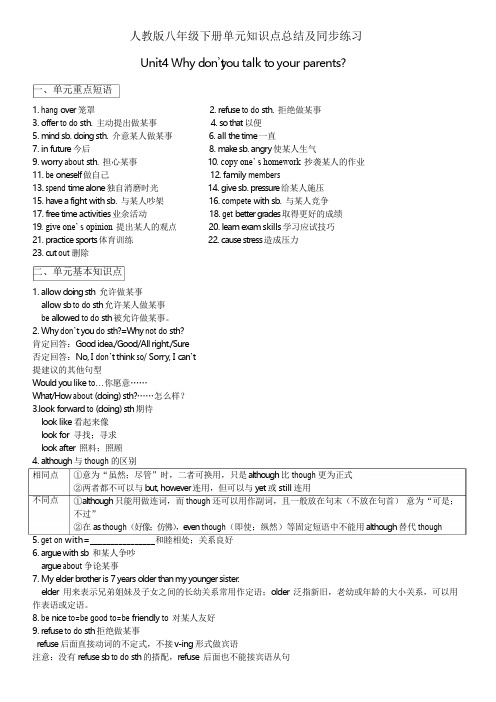
t 人教版八年级下册单元知识点总结及同步练习Unit4 Why don ’you talk to your parents?一、单元重点短语1. hang over 笼罩2. refuse to do sth. 拒绝做某事3. offer to do sth. 主动提出做某事4. so that 以便5. mind sb. doing sth. 介意某人做某事6. all the time 一直7. in future 今后8. mak e sb. angry 使某人生气 9. worry about sth. 担心某事10. copy one’ s homework 抄袭某人的作业 11. be oneself 做自己12. family members 13. spend time alone 独自消磨时光14. give sb. pressure 给某人施压 15. have a fight with sb. 与某人吵架16. compete with sb. 与某人竞争 17. free time activities 业余活动18. get better grades 取得更好的成绩 19. give one’ s opinion 提出某人的观点20. learn exam skills 学习应试技巧 21. practice sports 体育训练22. cause stress 造成压力23. cut out 删除二、单元基本知识点1. allow doing sth 允许做某事allow sb to do sth 允许某人做某事be allowed to do sth 被允许做某事。
2. Why don ’t you do sth?=Why not do sth?肯定回答:Good idea./Good/All right./Sure否定回答:No, I don ’t think so/ Sorry, I can ’t提建议的其他句型W ould you like to …你愿意……What/How about (doing) sth?……怎么样?3.look forward to (doing) sth 期待look like 看起来像look for 寻找;寻求look after 照料;照顾4. although 与 though 的区别相同点不同点 ①意为“虽然;尽管”时,二者可换用,只是 although 比 though 更为正式 ②两者都不可以与 but, however 连用,但可以与 yet 或 still 连用 ①although 只能用做连词,而 though 还可以用作副词,且一般放在句末(不放在句首) 意为“可是;不过”②在 as though (好像;仿佛),even though (即使;纵然)等固定短语中不能用 although 替代 though5. get on with=________________和睦相处;关系良好6. ar gue with sb 和某人争吵ar gue about 争论某事7. My elder brother is 7 years older than my younger sister .elder 用来表示兄弟姐妹及子女之间的长幼关系常用作定语;older 泛指新旧,老幼或年龄的大小关系,可以用 作表语或定语。
人教版初中八年级英语下册第四单元同步练习题 知识点总结 专题训练
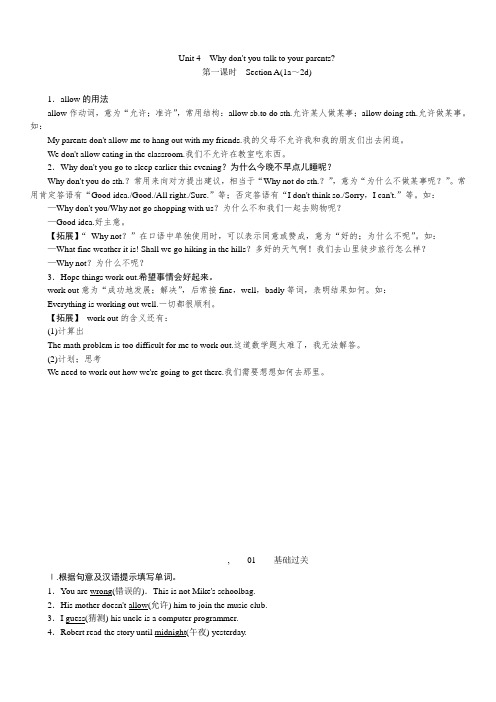
Unit 4Why don't you talk to your parents?第一课时Section A(1a~2d)1.allow的用法allow作动词,意为“允许;准许”,常用结构:allow sb.to do sth.允许某人做某事;allow doing sth.允许做某事。
如:My parents don't allow me to hang out with my friends.我的父母不允许我和我的朋友们出去闲逛。
We don't allow eating in the classroom.我们不允许在教室吃东西。
2.Why don't you go to sleep earlier this evening?为什么今晚不早点儿睡呢?Why don't you do sth.?常用来向对方提出建议,相当于“Why not do sth.?”,意为“为什么不做某事呢?”。
常用肯定答语有“Good idea./Good./All right./Sure.”等;否定答语有“I don't think so./Sorry,I can't.”等。
如:—Why don't you/Why not go shopping with us?为什么不和我们一起去购物呢?—Good idea.好主意。
【拓展】“Why not?”在口语中单独使用时,可以表示同意或赞成,意为“好的;为什么不呢”。
如:—What fine weather it is! Shall we go hiking in the hills?多好的天气啊!我们去山里徒步旅行怎么样?—Why not?为什么不呢?3.Hope things work out.希望事情会好起来。
work out意为“成功地发展;解决”,后常接fine,well,badly等词,表明结果如何。
Unit 4 知识点总结+单元练习题人教版英语八年级下册(附答案)
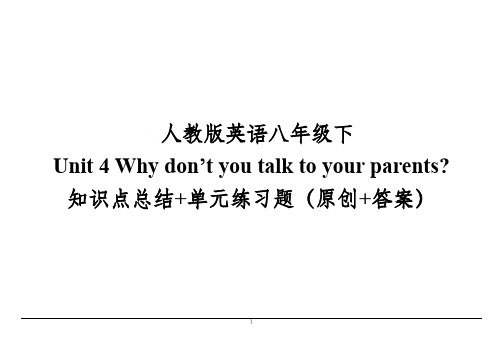
人教版英语八年级下Unit 4 Why don’t you talk to your parents?知识点总结+单元练习题(原创+答案)1一.重点词组:1.what’s wrong 哪不舒服?what’s wrong with sb 某人怎么了?2.look through 快速查看,浏览look up 查询look for 寻找look after 照顾look out = watch out 当心3.big deal 重要的事it’s not a big deal 不是要紧的事4.work out = figure out 解决,弄明白5.not...anymore 再也不6.cut out 删去pare...with 比较8.in one’s opinion 在某人看来9.hang out with sb 和某人闲逛10.after-school class 校外辅导课11.get into fight with sb 和某人打起来12.be angry with sb 对某人生气13.why don’t you do = why not do sth 为什么不做某事14.get on with sb 和某人相处得好15.be nice to sb 对某人友好16.mind sb doing sth 介意某人做某事17.on weekends 在周末二.重点单词1.allow v 允许allow doing sth 允许做某事allow sb to do sth 允许某人做某事sb is allowed to do sth 某人被允许去做某事2.guess v/n 猜have a guess = take a guess 猜一猜guess what? 您猜怎么着?3.deal v 处理;n 交易deal with sth 处理... = handle sth4.relation n 关系relative adj 相对的;n 亲戚relationship n 关系be related to sth 与...有关munication n 交流communicate v 交流6.argue v 争吵argue with sb 和某人争吵argument n 论点7.cloud n 云朵clouds 乌云8.instead adv 反而用法1:放在句首使用:She isn’t allowed to go out at this time of night. Instead, she should do her homework in her bedroom.用法2: 放在句尾连起来使用:She isn’t allowed to go out at this time of night. She should do her homework in her bedroom instead.instead of + 名词性短语9.nervous adj 焦虑的be nervous of/about sth10.offer v/n2offer sb sthprovide sth for sb = provide sb with sth supply sth for sb = supply sb with sth 11.proper adj 恰当的improper adj 不恰当的suitable adj 恰当的12.explain v 解释explanation n 解释13.clear adj 清晰的a clear day 晴天crystal clear 一清二楚的14.return v 返回return back 返还return to sb 还给某人15.member n 成员membership n 会员资格16.pressure n (物理)压力release pressure 释放压力stress (精神)压力reduce stress 减少压力pete v 竞争compete against sb 与某人竞争、攀比competition n 比赛competitive adj 竞争激烈的,好竞争的competent adj 有能力的,能胜任的18.skill n 技巧19.typical adj 典型的20.football n 美式橄榄球soccer 英式足球21.continue v 继续22.crazy adj 疯狂的be crazy about sth 对...感到痴狂23.push v 推push-up 俯卧撑pull v 拉24.develop v 发展development n 发展25.cause v 造成;n 原因cause sb to do sth 引起某人去做某事ual adj 平常的as usual 像往常一样27.perhaps adv 或许probably adv 或许possibly adv 或许34Unit 4 单元练习题一.重点词组考察二.重点单词考察三.课文翻译1. I have _____ _____ (太多) homework so I don’t have enough sleep.2. My parent don’t _____ _____ _____(允许我) hang out with my friends.3. I have _____ _____ (太多) after-school classes.4. I _____ _____ (陷入) a fight with my best friend.5. _____ _____ _____ (你为什么不)go to sleep earlier this evening?6. The house is _____ _____ (已经相当) clean and tidy.7. I found my sister _____ _____ (翻找) my things yesterday. 8. I guess you could tell her _____ _____ _____(去道歉).9. My problem is that I can’t _____ _____ _____ (和某人相处) my family. 10. My _____ _____ (大哥) is not very nice to me.11. He always _____ _____(拒绝) let me watch my favorite TV show. 12. It’s not easy _____ _____ _____ (处于你这个年龄). 13. You should _____ _____ _____ (提供去帮助).14. You don’t _____ _____ _____ _____ _____ _____ _____ (介意他一直在看电视).15. My sister borrows my clothes _____ _____ (没有问). 16. I am _____ _____ (担心) my school grades.17. You should tell him that _____ _____ _____ (抄别人的作业) is wrong. 18. _____ _____ _____ (他们中的许多人) are learning exam shills so that they can get into a good high school.19. They are always _____ _____ _____ (把他们和...做对比) other children.四.单项选择1.We can’t take this away until she _____ yes.A.will sayB. sayC. saysD. said2.She finally agrees with us _____ she did not like the plan at the beginning.A.ifB. unlessC. althoughD. when3.---Thanks for your sincere suggestion.---It’s my pleasure. Hope things _____.A.work outB. look outC. try outD. find out4.We are not allowed _____ or drink in the classroom.A.eatB. to eatC. eatingD. eaten5.The little boy _____ his book to the girl.A.providesB. suppliesC. bringsD. offers6.---Young people are always talking on their phones.---Yes, indeed. They should put down their phones and talk to people around them _____.A.stillB. eitherC. tooD. instead7.My _____ sister is three years _____ than me..A.elder; olderB. elder; elderC. older; elderD. older; older8.They didn’t leave for home _____ they finish their work.A.untilB. ifC. unless9.Chinese parents tend to compare their children _____ other kids.A.forB. toC. byD. with10.Do you mind me _____ the radio? It’s too noisy.A.turning upB. turning onC. turning downD. turn down11.Gloria offers _____ us prepare for the exams.A.helpB. to helpC. helpingD. helped12.Did you watch the TV show _____ the evening of August 24th?---Yes, I did. _____ my opinion, it’s wonderful.A.in, InB. in; OnC.on; OnD. on, In五.完形填空As though things weren’t 1._____ enough last spring, a wild turkey started showing up on my block. It’s normally one of the busiest intersections in Minneapolis, but this turkey walked down the sidewalk day after day 2._____ she belonged. As word 3._____ about her, more and more people came out to see her. A young woman told me that they had named her Tina—Tina the Turkey. Tina must have been 4._____ eggs in front of the neighbors’ house. She would sit and wiggle her rump in the same place in their yard every day. One day she walked with five other 5._____ through the parking lot, 6.______ the two-and-a-half-foot cement wall, and into the yard. I watched in surprise—six wild turkeys! One had her feathers ruffled; I think it must have been Tina. This was her 7._____ now. There were many days when Tina would stand in the parking lot—a dangerous place for a 8._____ bird—and refuse to move, blocking cars from coming or going. This became a show with Tina in the starring role until the day a new character appeared on stage: an strange-looking man with black hair. He looked 9._____. He was covered in dirt, his posture stiff. He approached Tina and began to strike curious poses in a beautiful dance. Tina 10._____ him in this dance. Together, they were art in motion. And because of the stay-at-home order, I got to see them. I’ll always remember this turkey when I think back on the corona-virus pandemic. She brought a lot of joy to a community at a time when people desperately needed an escape.1.A. funny B. strange C. wonderful D. humorous2.A. as if B. if C. even if D. even though3.A. gave out B. handed out C. set out D. got out4.A. lying B. laying C. lied D. laid5.A. neighbors B. places C. turkeys D. women6.A. on B. up C. in D. with7.A. place B. turkey C. right D. wall8.A. fat B. strong C. powerful D. slow-moving9.A. homeless B. hopeless C. strange D. careful510.A. embraced B. joined C. welcomed D. invited 答案:一.重点词组1.what’s wrong with sb2.look through3.look for4.big deal5.look out6.work out7.not ... anymore8.cut outpare ... with ...10.hang out with sb11.after-school class12.in one’s opinion13.get into fight with sb14.be angry at sb15.be friendly to/with sb16.on weekends17.sllow doing sth18.allow sb to do sth19.be allowed to do sth20.guess what21.a clear day22.crystal clear23.return back24.return to sb25.be crazy about26.cause sb to do sth27.as usualpete with/against29.help with sth630.reduce stress; release pressure31.be related to32.find sb doing sth二.重点单词1.relation2.relativemunication; communicate4.argument5.clouds6.continue7.anyway8.proper; improper9.sick; ill10.member11.membership12.neighborhood13.typical三.课文翻译1.too much2.allow me to3.too many4.get into5.Why don’t you6.already pretty7.looking through8.to say sorry9.get on with10.elder brother11.refuses to12.being your age13.offer to help14.mind him watching TV all the time15.without asking16.worried about17.copying others’ homework18.Many of thempare them with四.单项选择1-5 CCABD5-10 DAADC11-12 BD五.完形填空1-5 BADBC6-10 BADAB7。
人教版英语八年级下册单元Unit 4 知识点+测试卷+思维导图

Unit 4 Why don’t you talk to your parents?1.重点词汇:communication, relation, allow, argue, cause, communicate, compare, compete, continue, copy, explain, guess, offer, push, return, wrong, quick, clear, crazy, nervous, proper, typical, usual, instead, perhaps, secondly....2. 短语归纳:1. look through 快速查看;浏览2. big deal 重要的事3. work out 成功地发展;解决4. get on with 和睦相处;关系良好5. cut out 删除;删去6. compare...with 比较,对比7. in one’s opinion 依……看3. 必背典句:1. Why don’t you forget about it? Although he is wrong, it’s not a big deal.你为什么不忘记呢?虽然他错了,但没什么大不了的。
2. He should talk to his friend so that he can say he’s sorry.他应该和他的朋友谈谈,这样他才能说对不起。
3. I studied until midnight last night so I didn’t get enough sleep.我昨晚一直学习到午夜,所以我没有得到足够的睡眠。
4.语法知识:1. 提建议的常用表达有:Why don’t you...?/Why not do...? (你)为什么不……呢?2. until引导时间状语从句连词until意为“直到……为止;到……时”,引导时间状语从句,常放在主句之后,也可以放在主句之前。
人教版初二八年级(下)英语第四单元Unit4知识点+习题
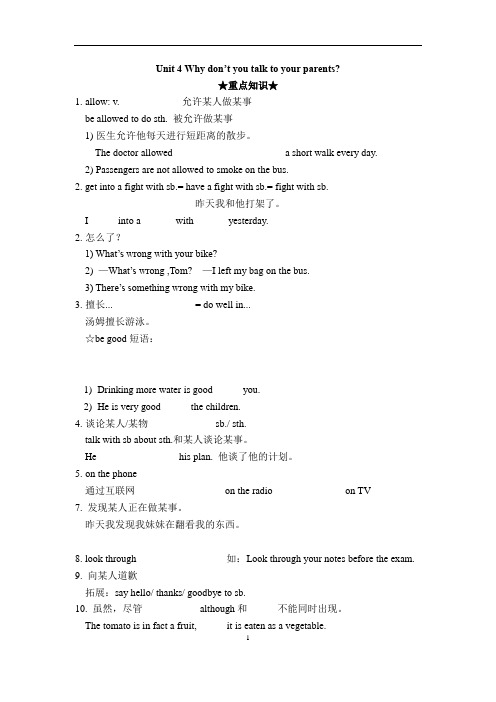
Unit 4 Why don’t you talk to your parents?★重点知识★1.allow: v. __________ 允许某人做某事__________________________be allowed to do sth. 被允许做某事1)医生允许他每天进行短距离的散步。
The doctor allowed _____ _____ _____ _____ a short walk every day.2) Passengers are not allowed to smoke on the bus.2. get into a fight with sb.= have a fight with sb.= fight with sb._____________________ 昨天我和他打架了。
I _____ into a ______ with ______ yesterday.2.怎么了?________________1) What’s wrong with your bike?2) —What’s wrong ,Tom? —I left my bag on the bus.3) There’s something wrong with my bike.3.擅长...________________ = do well in...汤姆擅长游泳。
_____________________________☆be good短语:1)Drinking more water is good _____ you.2)He is very good _____ the children.4.谈论某人/某物____________ sb./ sth.talk with sb about sth.和某人谈论某事。
He ________ _______ his plan. 他谈了他的计划。
八年级下册英语第四单元知识点
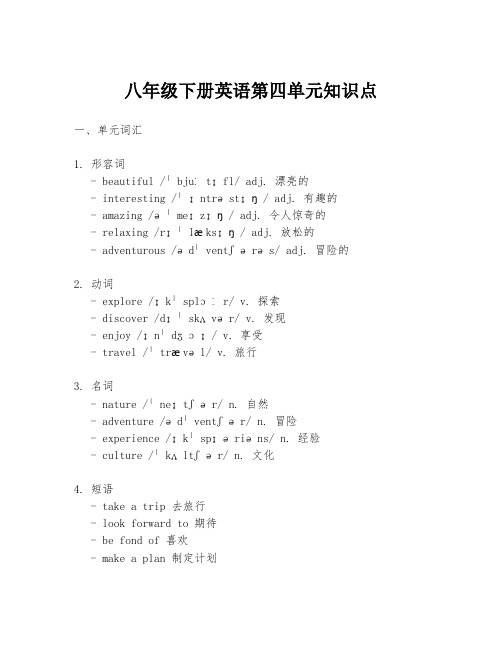
八年级下册英语第四单元知识点一、单元词汇1. 形容词- beautiful /ˈbjuːtɪfl/ adj. 漂亮的- interesting /ˈɪntrəstɪŋ/ adj. 有趣的- amazing /əˈmeɪzɪŋ/ adj. 令人惊奇的- relaxing /rɪˈlæksɪŋ/ adj. 放松的- adventurous /ədˈventʃərəs/ adj. 冒险的2. 动词- explore /ɪkˈsplɔːr/ v. 探索- discover /dɪˈskʌvər/ v. 发现- enjoy /ɪnˈdʒɔɪ/ v. 享受- travel /ˈtrævəl/ v. 旅行3. 名词- nature /ˈneɪtʃər/ n. 自然- adventure /ədˈventʃər/ n. 冒险- experience /ɪkˈspɪəriəns/ n. 经验- culture /ˈkʌltʃər/ n. 文化4. 短语- take a trip 去旅行- look forward to 期待- be fond of 喜欢- make a plan 制定计划二、语法点1. 一般将来时- 用法:表示将来某一时间要发生的动作或状态。
- 结构:主语 + will + 动词原形 + 其他。
2. 现在进行时表示将来- 用法:表示按计划或安排将要发生的动作。
- 结构:主语 + am/is/are going to + 动词原形 + 其他。
3. 形容词的比较级和最高级- 用法:比较两者或三者以上的人或事物。
- 结构:比较级 - 更…,最高级 - 最…。
三、重点句型1. I can’t wait to…- 用法:表示迫不及待要做某事。
- 例句:I can’t wait to see the Eiffel Tower.2. It’s a good idea to…- 用法:表示做某事是个好主意。
最全面人教版八年级下册英语第四单元知识点归纳总结
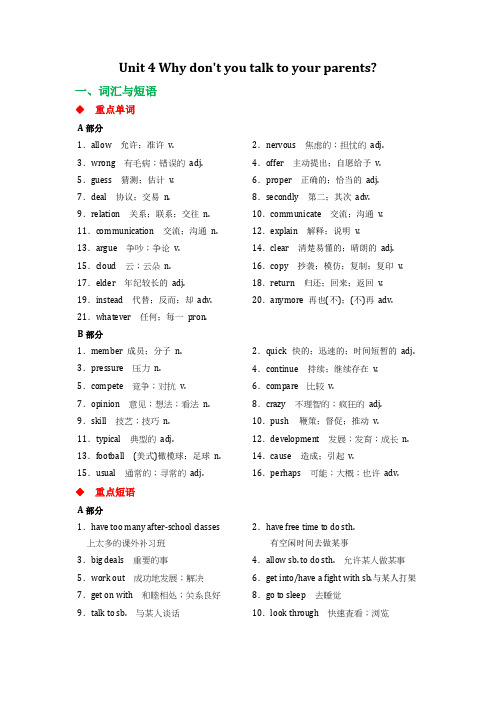
Unit 4 Why don't you talk to your parents?一、词汇与短语◆重点单词A部分1.allow 允许;准许v.2.nervous 焦虑的;担忧的adj. 3.wrong 有毛病;错误的adj.4.offer 主动提出;自愿给予v. 5.guess 猜测;估计v.6.proper 正确的;恰当的adj. 7.deal 协议;交易n.8.secondly 第二;其次adv. 9.relation 关系;联系;交往n.10.communicate 交流;沟通v. 11.communication 交流;沟通n.12.explain 解释;说明v.13.argue 争吵;争论v.14.clear 清楚易懂的;晴朗的adj. 15.cloud 云;云朵n.16.copy 抄袭;模仿;复制;复印v. 17.elder 年纪较长的adj.18.return 归还;回来;返回v. 19.instead 代替;反而;却adv.20.anymore 再也(不);(不)再adv. 21.whatever 任何;每一pron.B部分1.member 成员;分子n.2.quick 快的;迅速的;时间短暂的adj. 3.pressure 压力n.4.continue 持续;继续存在v. 5.compete 竞争;对抗v.6.compare 比较v.7.opinion 意见;想法;看法n.8.crazy 不理智的;疯狂的adj. 9.skill 技艺;技巧n.10.push 鞭策;督促;推动v. 11.typical 典型的adj.12.development 发展;发育;成长n. 13.football (美式)橄榄球;足球n.14.cause 造成;引起v.15.usual 通常的;寻常的adj.16.perhaps 可能;大概;也许adv.◆重点短语A部分1.have too many after-school classes 上太多的课外补习班2.have free time to do sth.有空闲时间去做某事3.big deals 重要的事4.allow sb. to do sth. 允许某人做某事5.work out 成功地发展;解决6.get into/have a fight with sb.与某人打架7.get on with 和睦相处;关系良好8.go to sleep 去睡觉9.talk to sb. 与某人谈话10.look through 快速査看;浏览11.get enough sleep 得到充足的睡眠12.call sb. up 给某人打电话13.on the phone 在电话中14.so that 以便;为了15.give sth. back to sb. 把某物归还给某人16.forget about sth. 忘记关于某事17.hang over 笼罩在……18.be nice to sb. 对某人友好19.until late at night 直到深夜20.refuse to do sth. 拒绝做某事21.let sb. do sth. 让某人做某事22.talk about sth. with sb.与某人谈论某事23.offer to do sth. 主动提出做某事24.be afraid of doing sth. 害怕做某事25.communicate with sb. 与某人交流B部分1.in one's opinion 依……看2.spend time alone 独自消磨时光3.a lot of pressure 许多压力4.not……until……直到……才……5.free time activities 业余活动6.have a quick dinner 很快吃完晚饭7.the common problem 普遍问题8.compare…with…把…和…作比较,对比9.cut out 删除;删去10.know about 了解11.be important for sth. 对……重要12.keep on doing sth. 一直做某事13.send sb. to……派某人去……14.worry about 担心15.give one's opinion about sth.就某事给出某人的观点16.differences and similarities 不同点和相似点17.too much pressure 太多的压力18.compete with sb. 与某人竞争19.think for oneself 为某人自己着想20.push sb. so hard 逼迫某人太紧21.cause a lot of stress for sb. 给某人造成很多压力◆重点句子A部分1.Why don't you go to sleep earlier this evening? 为什么你今晚不早点儿去睡觉呢?2.What's wrong with you? 你哪儿不舒服?3.Although she's wrong, it's not a big deal. 尽管她做得不对,但也没什么大不了的。
人教版丨八年级下册英语4单元重点句型解析(附练习题及答案)

人教版丨八年级下册英语4单元重点句型解析(附练习题及答案)人教版丨八年级下册英语4单元重点句型解析(附练习题及答案)重点句型解析1. Why don’t you talk to your parents?“Why don’t you + 动词原形+ 其他?”相当于“Why not + 动词原形+ 其他?”意为“为什么不……?”并不表示疑问,而是作建议、询问。
例如:Why don’t you go with us? = Why not go with us?为什么不同我们一起去呢?Why don’t you go swimming? = Why not go swimming?为什么不去游泳呢?【拓展】why not用在口语中表示赞同,意为“当然,好啊”。
例如:—Let’s go to the movies. 我们看电影吧。
—Why not? 好啊!2. I’m really tired because I stu died until midnight last night.until意为“直到……”,有下列用法:(1)作介词,后接时间名词,在句中作时间状语。
例如:She waited there until 9 o’clock. 她一直等到9点钟。
(2)作连词,后接从句,引导时间状语从句。
例如:We waited until the rain stopped. 我们等到雨停了。
【拓展】(1)until用在肯定句中,多与持续性的动词连用。
如stand/wait/stay等,表示主句动作的终止时间。
例如:I will wait here until you come back.我会在这里等到你回来。
(2)until可用于否定句中,即not…until…意为“直到……才”,常与非延续性动词连用。
如open/start/leave/arrive等,强调主句动作开始的时间。
例如:The child didn’t go to bed until his father came back.直到父亲回来,那个孩子才睡觉。
初中英语人教新目标八年级下册Unit4Grammar预习指导(知识点+练习题)
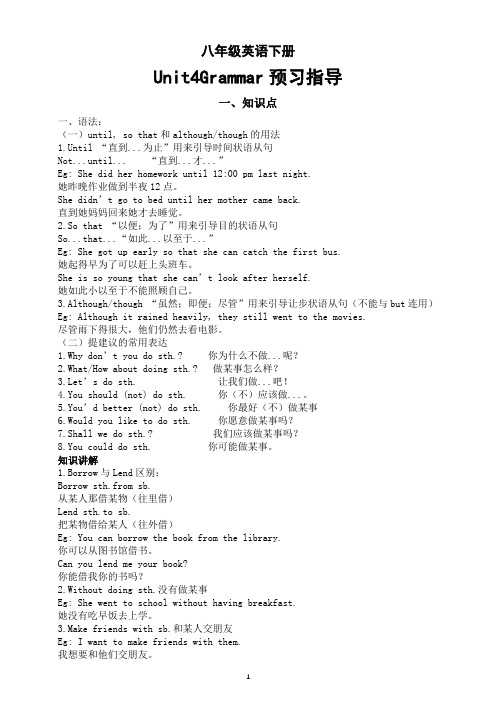
八年级英语下册Unit4Grammar预习指导一、知识点一、语法:(一)until, so that和although/though的用法1.Until “直到...为止”用来引导时间状语从句Not...until... “直到...才...”Eg: She did her homework until 12:00 pm last night.她昨晚作业做到半夜12点。
She didn’t go to bed until her mother came back.直到她妈妈回来她才去睡觉。
2.So that “以便;为了”用来引导目的状语从句So...that...“如此...以至于...”Eg: She got up early so that she can catch the first bus.她起得早为了可以赶上头班车。
She is so young that she can’t look after herself.她如此小以至于不能照顾自己。
3.Although/though “虽然;即便;尽管”用来引导让步状语从句(不能与but连用)Eg: Although it rained heavily, they still went to the movies.尽管雨下得很大,他们仍然去看电影。
(二)提建议的常用表达1.Why don’t you do sth.? 你为什么不做...呢?2.What/How about doing sth.? 做某事怎么样?3.Let’s do sth. 让我们做...吧!4.You should (not) do sth. 你(不)应该做...。
5.You’d better (not) do sth. 你最好(不)做某事6.Would you like to do sth. 你愿意做某事吗?7.Shall we do sth.? 我们应该做某事吗?8.You could do sth. 你可能做某事。
八年级下册英语第四单元2d知识点
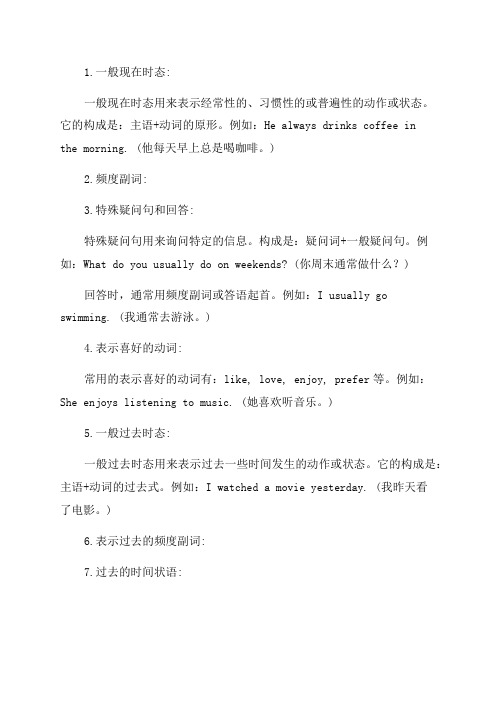
1.一般现在时态:一般现在时态用来表示经常性的、习惯性的或普遍性的动作或状态。
它的构成是:主语+动词的原形。
例如:He always drinks coffee inthe morning. (他每天早上总是喝咖啡。
)2.频度副词:3.特殊疑问句和回答:特殊疑问句用来询问特定的信息。
构成是:疑问词+一般疑问句。
例如:What do you usually do on weekends? (你周末通常做什么?)回答时,通常用频度副词或答语起首。
例如:I usually go swimming. (我通常去游泳。
)4.表示喜好的动词:常用的表示喜好的动词有:like, love, enjoy, prefer等。
例如:She enjoys listening to music. (她喜欢听音乐。
)5.一般过去时态:一般过去时态用来表示过去一些时间发生的动作或状态。
它的构成是:主语+动词的过去式。
例如:I watched a movie yesterday. (我昨天看了电影。
)6.表示过去的频度副词:7.过去的时间状语:过去的时间状语用来表示过去一些时间发生的动作或状态。
例如:yesterday, last week, two days ago等。
例如:He went to the beach last weekend. (他上周末去了海滩。
)8.句型转换:句型转换可以通过改变句子的结构或使用不同的词语来表达相同的意思。
例如:He always drinks coffee. (这是一个陈述句)Does he always drink coffee? (这是一个一般疑问句)注意在一般疑问句中,需要在句子开头加上助动词does.9.定语从句:定语从句用来给一个名词或代词加以修饰或限定。
它的引导词有:that, which, who, whom等。
例如:The book that I borrowed from the library is very interesting. (我从图书馆借的那本书很有趣。
八年级英语下册第四单元知识点归纳

新版八年级英语下册第四单元知识点归纳Unit 4 Why don’t you talk to your parentsWhy don’t you talk to your parents 你为什么不和你打父母谈谈呢解析Why don't you do sth = Why not do sth 为什么不......呢拓展用于提建议的句型有:1What about doing sth =How about doing sth ….怎么样2Why don’t you do sth= Why not do sth 为什么不呢3Let’s do sth.让我们一起做某事吧;4Shall we/I do sth 我们做…好吗5had better do/not do sth 最好做/不做某事6 Will/Would you please do sth 请你做…好吗7 Would you like to do sth 你想去做某事吗8Would you mind doing sth你介意做某事吗回答1. 同意对方的建议时,一般用:◆ Good idea./ That’s good idea. 好主意◆OK/ All right./ Great 好/ 行/太好了◆ Yes, please ./ I’d love to 是的/ 我愿意◆ I agree with you 我同意你的看法◆ No problem 没问题◆Sure/ Of course/ Certainly 当然可以◆Yes, I think so 对,我也这样想2.对对方的帮助或要求表示委婉谢绝时,一般用:◆ I don’t think so 我认为不是这样◆Sorry, I can’t 对不起,我不能◆I’d love to, but…◆ I’m afraid…我愿意,但恐怕……I have to study too much so I don’t get enough sleep. 我要学的太多,因此我睡眠不足; 解析11too many + 复数名词许多 too many people2too much +不可数名词许多 too much homework3much too +形容词太…much too cold解析2so conj. 因此表示因果关系,后面跟表示结果的句子,不与because同时使用My parents don’t allow me to hang out with my friends. 我的父母不允许我和我的朋友们出去闲逛;解析allow sb. to do sth 允许某人做某事拓展allow v 允许allow doing sth 允许做某事They don’t allow smoking.allow sb. to do sth 允许某人做某事My mother allows me to watch TV.be allowed to do sth 被允许做某事①We don’t allow ___________smoke in the reading room.②Our teacher allows us ____________go out for a walk.③The boy should be allowed____play after supper.④We won’t allow ________in the cinema .But you are allowed ______in the rest room.smoke⑤Teenagers should ___________ allow to choose their own clothes.拓展allow与let的辨析:allow指“允许”,表示“默许,听任,不加阻止”,allow sb to do sth允许某人做某事;Let指“让”,let sb do sth让某人做某事,语意较弱,多用于口语中,let不能用于被动语态;4. What’s wrong 怎么啦解析What’s wrong with sb./ sth 某人/物怎么了I’m real ly tried because I studied until midnight last night. 我真的很累,因为我昨天晚上一直学习到半夜;解析until 直到......时Why don’t you go to sleep earlier this evening今天晚上你为什么不早点睡觉呢解析go to sleep 去睡觉强调“入睡,睡着”这一动作7. You look sad, Kim. 金,你看起来很伤心;解析look 看起来系动词,后跟形容词作宾语拓展:系动词:后跟adj. 作表语一是:be am /is /are be quiet=keep quiet 保持安静二保持:stay/keep 表示持续状态 stay healthy=keep healthy 保持健康三变化:become/get/turn 表示状态变化五起来:sound/look/smell/taste/feel 表示感觉Jack usually gets ______ when he speaks in public. A. happily B. exciting C. worried D. tiredTom’s father looks very _____. But he is very kind. A. seriously B. serious C. friendly You ____ call him up. 你____ 给他打电话;解析call up v + adv call on 拜访;号召 I call up my parents every Sunday., I found my sister looking through my things yesterday. 哦,昨天我发现我妹妹翻了我的东西;解析1find sb. doing sth 发现某人正在做某事Mr. Wang found Li Dong reading a storybook in the class.类似动词:hear,watch, see, feel解析2look through 浏览拓展与look相关的短语:look for look after=take care of look like look the same look over look through look out look up look around look forward to10. Yes, but I’m still angry with her. 是的,但是我仍然很生她的气;解析be angry with sb. 生某人的气拓展angry adj. 生气的→ angrily adv. 生气地1be angry with sb. =be mad at sb. 对某人生气with后接人2be angry at/about sth对某事感到生气 at后接事3be angry to do sth 做某事感到生气记 My father was very __________对……生气his computer. He hit the computer_______angry—Why are you unhappy, Kate —I didn’t finish my homework again. I’m afraid Miss Gao will be ___ me.A. angry withB. friendly toC. proud ofI was very angry ____ myself ___ making such as a stupid mistakes.A. at; atB. with; forC. at; withD. with; atshe’s wrong, It’s not a big deal. 尽管她错了,但也不是什么大错;解析1although= though 尽管 , 用来引导让步状语从句;注though / although 不能与but连用拓展although/however辨析⑴although conj,“虽然;即使;纵然”,引导让步状语从句时放在主句前后都可;Although he is very old, yet he is quite strong.他虽然年纪大了,但身体还很健壮;⑵ however adv,在句中作插入语,起一个连词的作用,一般用逗号与句子分开,可以放在句首或句中,意为“然而,尽管如此”;It’s raining hard, However, I think we should go out.雨下的很大;尽管如此,我认为我们还应该出去;解析2It’s not a big deal. 没什么大不了;不是什么大事常用于口语中You left your homework at home. 你把作业忘在家里了;解析leave v 遗忘,留下 leave sth . somewhere把某物忘在某地 leave sb. by oneself 把某人单独留下12. Hope things work out. 希望事情顺利解决;解析1hope v 希望hope to do sth I hope to visit Guilin. hope + that 从句表示希望I hope that you’ll be better soonwish v 希望 wish to do sth I wish to visit Guilin.wish do sth 希望某人做某事 I wish you to go.wish +that 从句表示愿望,从句用虚拟语气 I wish I were you.解析2work out 解决;成功地发展,后跟fine,well, badly等词,表明产生的结果如何; problem is I can’t get on with my favorite. 我的问题是我不能喝我的家人和睦相处; 解析get on with sb. 和某人和睦相处;和某人关系良好 =get along with get on well/ badly with 相处的好/坏they argue, it’s like a big, black cloud hanging over our home.当他们争吵的时候,就像有一大团乌云笼罩在我们家;解析1argue 争吵→argument n 争论 have an argument with sb.与某人辩论argue with sb. 与某人争吵 argue with sb. about sth 为某事与某人争吵 argue about sth 争论某事argue against 争辩;反对 He argued against the plan解析2 hang over 挂在......之上;悬浮在......之上hang out 闲逛;常去某处 He likes reading and he often hangs out in the bookshop.hang on to 紧紧抓住You’d better hang on t o me in the crowd.hang up 挂电话;悬挂 After she finished her conversation, my elder brother is not very nice to me.解析elder adj.年纪较长的 His elder brother is ill.elder用来表示兄弟姐妹及子女之间的长幼关系,常用作定语older泛指新旧、老幼或年龄的大小关系,可以用作表语,是old的比较级形式;记 My ______brother is 7 years older than my younger sister.解析2be nice to sb. 对某人友好 be friendly to sb. be good to sb.always refuses to let me watch my favorite TV show. 他总是拒绝让我看我最喜欢的电视节目;解析refuse =say no to v拒绝 refuse to do sth拒绝去做某事①The boy refused __________go to see his father with us.②He refused when I asked him for help. A. said yesB. said no C. said hellohe watches whatever he wants until late at night.相反,他却想看什么酒看什么, 一直到深夜;解析1 instead 代替,反而,替1 instead 副词,代替,常放在句首或句尾,表示前面的事情没做,而做了后面的事情;Lee was ill so I went instead.李病了,所以我去了;2 instead of +n/doing 代替,而不是,放在句中instead of 为介词短语,后面一般接名词、代词、介词短语或动名词形式;She wrote to him instead of calling him.=She didn’t call him. She wrote to him instead.她没有给他打电话,而是给他写了封信;Health is very important to us. We should eat more vegetables and fruit _____ rich food.A. insteadB. instead ofC. because ofD. because解析2 whatever = no matter what 任何,每一your parents are having problems, you should offer to help. 如果你的父母有问题,你应该主动提供帮助;解析 offer to do sth 主动提出做某事拓展offer v 主动给予1 offer to do sth 主动提出做某事2offer sb. sth= offer sth to sb. 主动提供给某人某物The little boy _____ his seat to the old lady on the crowded bus. A. offered B. brought C. lent D. took,why don’t you sit down and communicate with your brother 其次,你为什么不能坐下来和你的哥哥交流一下呢解析1secondly adv.第二;其次解析2communicate v交流 communication n 交流;沟通communicate with sb. 和某人交流They communicate with each other by .They can’t understand each other so they have difficulty in _____.A. communicateB. communicatedC. communicatingshould explain that you don’t m ind him watching TV all the time. 你应该跟他解释说你并不介意他一直看电视;解析explain 解释;说明→ explanation n 解释;说明explain sth to sb. 向某人解释某事; explain to sb sth给某人解释某事21. I’m worried about my school grades. 我很胆小我的学习成绩;解析 be worried about sth. 担心某事拓展worry v 担心→ worried adj. 焦急的 worry about = be worried about 为…担心①Don’t be _________worry. You’ll catch up with others.② Don’t ____ about things so much. It will make you stressed out.afraid B. worry C. worried D. Terrifiedcousin borrows my things without returning them.我堂弟借我东西没有还我;解析return ⑴v 归还=give back return ... to ... = give back to ... 把......还给......⑵ v 回来;返回 = come backparents give me a lot of presure about school.我父母在学习上给了我很多压力;解析press v 按;压→pressure压力⑴不可数名词物理学压力air pressure 气压 blood pressure 血压⑵不可数名词还可指精神上、外界施加的压力 = stress under pressure 在压力下have to compete with my classmates at school.在学校我不得不和我的同学们竞争;解析compete v竞争;对抗→ competition n 竞争compete with sb. 和某人竞争compete against/ with 与……竞争compete for 为……参加比赛We are ready for the coming ________________compete.should all be ___ each other to improve. 你们都应该互相____ 而全面发展;解析improve =make ... better 改进→improvement n 提高gives their opinions about the problem 对于这个问题都有谁提出了他们自己的观点;解析opinion n 意见;想法;看法in one’s opinion 以某人的观点;在某人看来give opinions about sth. 给出关于某事的观点;days , Chinese children are sometimes busier on weekends than weekdays because they have to take so many after-school classes .目前,中国的孩子有时周末比平常还要忙,因为他们不得不上那么多的课后辅导班;解析some time /sometime/some times/sometimes口诀:分开是一段, 合起是某时;分开s 是倍次,合起s是有时1 some time一段时间,做时间状语 It takes sb. some time to do sth. 做某事花费某人多长时间2 sometime adv 在某个时候,3 some times 名词词组,“几次,几倍”Mr. Green went to Sanya some times last summer.4sometimes=at times 有时一般现在时的标志词I hope to visit the USA _____ in the future.A. sometimesB. some timesC. sometimeD. some time28. Others are practicing sports so that they can compete and win. 其他人正在练习体育运动, 这样他们就能参与竞争并获胜;解析others pron. “其他的人或事物”There are other ways of doing it. 做这事还有其他的办法;My sister is outgoing . She likes making friends with ____.A. otherB. anotherC. the otherD. othersTaylors are a typical American family.泰勒一家是一个典型的美国之家;解析1The Taylors 泰勒一家 ; 在姓氏的复数前加冠词the表示“全家人或夫妻两人”,使用时注意主语和谓语保持一致;The Blacks are getting ready for the holiday.解析typical 典型的be typical of “是……的特点”30.. Maybe I could cut out a few of their activities, but I believe these activities are important for my children’s future.或许我可以减少他们的一些活动, 但是我相信这些活动对孩子们的未来很重要;解析cut out 删除;删去v+adv You’d better cut out that sentence.cut up 切碎 cut down 砍到 cut in 插队 cut off 切断水、电供应Don’t ___ when others talk; it’s impolite. A. cut out B. cut in C. cut down D. cut off31. I really want them to be successful. 我真的很想他们成功;解析successful 成功的拓展 succeed v 成功,达到→success n 成功→successful adj 成功的→successfully adv成功地◆succeed in doing st h①If at first you don’t ____________success . try, try again.② She works very hard ,so she will ____ in ____ the exam.A. successful; passB. success ;passingC. succeed; passingD. successful; passing ’s time for homework.该写作业了;解析It’s time for sth 是到做某事的时候了;It’s time for lunch. It’s time to do sth It’s time to go to school.It’s 9:30 pm., children _____ is time to go to bed.A. ThatB. ItC. ThisD. TheyIn some families, competition starts very young and continues until the kids get older. 在有些家庭,竞争从孩子们很小的时候就开始了,一直持续到他们长大;解析continue 继续;持续拓展continue doing sth =go on doing sth 继续做某事前后做同一件事continue to do sth = go on to do sth 继续做某事前后不是同一件事①Let’s continue____________read the text.②Many students hope to continue ________ study after _______finish s chool.③ The two teams continued _____ the game after half an hour.A. playB. to playC. playingD. played拓展continue,go on, last辨析⑴continue v.继续,持续,指进程在时间或空间上的延续,强调持续不断,有时也可以指短暂停止后继续进行;He continue the work for two days.他连续两天都在做这项工作;⑵ go on指无间歇或有间歇地继续,或以某种特定方式继续;go on to do sth继续做某事,指开始做另外一件事;go on doing sth继续做原来所做的事情;After doing his homework, he went on to preview his lessons.做完家庭作业之后,他继续去预习他的研究;⑶last v.持续,延续,维持,指某事物继续存在或某种现象在时间上延续,说明某一动作要延续一段时间;She won’t last long in that job.那个工作她做不了多久;send their small kids to all kinds of classes. 妈妈们把她们的小孩子送去各种各样的辅导班;解析1send→ sent → sent v 发送短语: send away 赶走 send for 派人去请send off 寄出 send out 分发 send up 发射send sb. sth = send sth to sb. 送给某人某物注类似的动词有:show 展示;给……看 give 给 lend 借出 offer提供 return 归还 tell告诉① You fill in both parts of the form, . send up it B. send for it C. send it awayD. send it offPlease send a photo of your family ____ me. A. for B. at C. to D. with解析2all kinds of 各种各样的拓展kind 1 n 种类kind of +adj.有点,有几分,kind of cold 有点冷 a kind of 一种的,某种的 all kinds of 各种各样的different kinds of 不同种类的What kind of…那种2 adj. 友好的 be kind to sb. = be good to sb.=be friendly to sb. 对某人友好辨析kind of 与kinds of:○1kind of 单独用,表示“有点”,后接形容词或副词:He is kind of thin.”他有点瘦”I feel kind of hungry.”我有点饿”Uncle Wang speaks kind of quickly. 王叔叔说得有点快;○2若kind of前有a, this, that, what等,译为“种,种类” 后加名词;That kind of question is difficult to answer. 那类问题难回答;What kind of sport do you like best 你最喜欢何种运动①This kind of skirt looks ___ and sells _____.A. nice ; wellB. nice; goodC. well; wellD. good ;nice②—What ____ animals do you like —Monkeys. I think they’re _____ clever.A. kind of; kind of B . a kind of ;a kind of C. kind of; a kind D. a kind of ; kind of③ —It’s going to rain. Let me fetch an umbrella for you. — Thank you You are so ____.A. luckyB. kindC. relaxedD. Interesting2013浙江台州17. —I want to see the movie Iron Man 3 钢铁3. Do you know the ______ of the ticket—Yes. Five dollars.A. numberB. priceC. kindD. name35..Kids should have time to relax and think for themselves, too. 孩子们也应该有时间放松和独立思考;解析have time to do sth 有时间做某事36. And they are always comparing them with other children.她们总是把自己的孩子和其他的孩子作比较;解析compare A with B 将A和B 比较1compare…with…把……与…..做比较2 compare…to… 把…..比做……①. People often compar e a teacher a candle.A. toB. intoC. asD. with②. It’s necessary English Chinese in English study.A. compare ; toB. to compare ; withC. comparing ; toD. to compare; into2011四川广元— Why are most children under too much pressure— Because their parents always compare them ___ others.A. WithB. byC. to37. Doctors say too much pressure is not good for a child’s development.医生说太多的压力不利于孩子们的发展;解析1be good for 对......有好处拓展good better ; best adj. 好的→ goodness n 好处;善行;美德be good for 对….有益处反 be bad for对…有害处be good at +n/doing=do well in +n/doing 擅长于做某事be good to sb. =be kind to =be friendly to sb.对某人友好记The boy is good ______me .He is good ______English , and he tells me oral practice is good ______improve spoken English.. Alice Green says all these activities can cause a lot of stress for children.爱丽丝. 格林医生说所有的这些活动可能给孩子们带来很多压力;解析 cause v. 造成,使发生1 cause sb. to do sth 使某人做某事2 cause sb. for sb. 给某人添麻烦①She always ___ trouble ___ people.A. cause; toB. cause ; forC. causing; toD. causing; for②Every year driving after drinking wine ____ a lot of traffic accidents.A. happensB. providesC. causes拓展 cause, reason, excuse辨析⑴cause n.原因,指引起某种结果的“原因”,后接介词of.The cause of the accident was the fact that he was driving too fast.事故的原因是他开车开的太快;⑵reason n.理由,原因,指决定做某事或采取某项行动的理由;The reason he was driving so fast was that he didn’t want to miss an important meeting.他开车如此快的原因是他不想错过一个重要的会议;⑶excuse n.辩解,借口,指对某种行为所做的解释,可以是真的,也可以是托词;He made a good excuse for his driving.他为自己开快车找了一个堂皇的借口;What ___ the flowers to die A. made B. had C. caused D .getDo you often ___ trouble ____ your parents A. get; into B. pay; for C. cause; forD. give; to39. .In my opinion, it is important for children/ parents to ... 我认为, 对于孩子们/父母来说, ......是重要的;解析in one’s opi nion 以某人的观点;在某人看来40. Perhaps children/ parents should / could ......或许孩子们/父母应该/ 可能....... 解析perhaps 也许;可能拓展perhaps,probably,possibly,maybe辨析⑴perhaps意为“也许,可能”,一般指比较小的可能性;Perhaps I will see him the day after tomorrow, but I am not sure.也许我后天去看他,不过我不能确定;⑵probably“很可能,大概”,其可能性最大,表示一种几乎完全肯定的意思;He will probably refuse the offer.他很可能会拒绝这份提议;⑶possibly意为“可能,或许,也许”,可能性较大;I’ll see you today, or possibly tomorrow.我今天要见你,不过也可能是明天;⑷maybe“或许,大概”,主要用于非正式场合,常用在口语中,语气比perhaps轻;Maybe you put the letter in your basket. 或许你把信放在你的篮子里了;41. It’s crazy. 这是疯狂的;解析crazy. adj. 不理智的;疯狂的在句中作定语、表语、宾语补足语be crazy about 对……着迷;热衷于……I’m crazy about football.42. Does Cathy Taylor think it’s important for kids to join after-school activities 凯西. 泰勒认为对于孩子们而言参加课文活动重要吗解析It’s + adj.easy,difficult,important,necessary +for sb. to do sth注若形容词表示事物特征的,如:easy ,difficult, hard ,important等,须用介词for 形容物,用forIt’s +adj kind, honest, friendly, +of sb to do sth.注若形容词表示人的性格、品质与特点,如:good ,kind ,nice, wrong等,用介词of;形容人用of2012山东东营It’s very con venient ___ us to buy train tickets now because we can buy them either from the station or on the Internet. A. to B. of C. by D. for① It’s important for us _______learn English well.②It’s hard for us ____________finish this task in two days.③ It’s very nice ____ you to help me a lot. A. for B. of C. in D. on④ –It’s very ___ of you to work out the problem for me. A. kind B. polite C. cleverD. easy43. keep on happening 持续发生解析keep on doing 继续做某事 keep sb. doing sth 让某人一直做某事 keep up with 跟上keep sb. from doing sth阻止某人做某事 keep away from避开Mr. Li kept _________work here for nearly 30 years.二、重点语法1. 情态动词should与could的用法should的用法should为情态动词,表示劝告、建议,意为“应该”,它和其他情态动词一样,没有人称和数的变化,后接动词原形,其否定形式为shouldn’t;Maybe she should say sorry to you.也许她应该跟你说声对不起;could的用法情态动词could既是can的过去式,表示过去的能力,又可以表示谨慎、客气的建议,后接动词原形,其否定形式为couldn’t;My grandfather could drive well even at the age of eighty.我的祖父甚至到了80岁任然能很好地驾车;You could go out and buy her some medicine. 你可以出去给他买些药;The girl_____ read before she went to school. A. Coul d B. Couldn’t C. Should D. May 2.状语从句状语从句就是在句子中作状语的从句;状语从句有好几种,如时间状语从句、原因状语从句、条件状语从句、结果状语从句、目的状语从句等;本单元重点讲述以下三种类型的状语从句;1.until引导的时间状语从句until意为“直到;在........之前”;注意until和not.....until在用法上的区别;Until:在带有till或until引导的时间状语从句里如果主句用肯定式,其含义是“一直到……时”,谓语动词只能用延续性动词;如果主句用否定式,其含义是“直到……才……”, 谓语动词可用瞬间动词;The young man read till the light went out. Let’s wait until the rain stops.We won’t start until Bob come Don’t get off until the bus stops. Continue in this direction until you see a sign.一直朝着这个方向走直到你看见一个指示牌;I didn’t wake up until I heard the alarm clock. 直到听到闹钟的铃声我才醒来;2.so that引导的目的状语从句so that是连词,意为“为的是,以便”,引导目的状语从句;注意so that, in order that和in order to在用法上的区别;Let me take down your telephone number so that I can call you later.让我记下你的号码,为的是以后好打电话给你;3. although引导的状语从句although的用法意思相当于though尽管,虽然,用来引导让步状语从句;它所引导的从句不能与并列连词but,and, so等连用,但可以和yet, still等词连用;① Although the book was old, we decided to buy it.尽管这本书很旧,我们还是决定买;② Although he was tired, he went on working.Although he had only entered the contest for fun, he won first prize.尽管他参加这次竞赛只不过是闹着玩而已,却赢得了头等奖;。
Unit4核心短语句型考点及练习题讲义2021-2022学年人教版八年级英语下册

Unit 4 Why don’t you talk to your parent?一、常用词组1.allow sb.to do sth,允许某人做某事2. have free time to do things I like 有空闲的时间做我喜欢的事3. have too many after-school classes 有太多的课外辅导课4. get into a fight with sb.=have a fight with sb.和某人打架5.until midnight直到半夜6. write sb. a letter=write a letter to sb.=write to sb.给某人写信7.take him to the ball game 把他带去看球赛8. talk about sth. on the phone 在电话上谈论某事9. look through 浏览10. give sth. back to sb.=return sth. to sb.把某物归还给某人11. a big deal 一件重要的事12.work out 解决13. get on with=get along with 与……和睦相处14.fight a lot 经常打架15.hang over 悬挂在…….上方16.my elder brother 我的哥哥17.be nice to sb.对某人友好18. feel lonely and nervous 感到孤独和紧张19.offer to do sth,主动提出做某事20.have more time for proper communication 有更多的时间进行适当的沟通municate with sb.和某人沟通22. copy others' homework 抄别人的作业23. try to be friendlier 试着友好点24. just be yourself 就做你自己25. leave homework at home 把作业落在家里26. help lower your stress帮助你减压27.family members 家庭成员28. compete with sb.和某人竞争29. free time activities 业余活动30. a typical American family 一个典型的美国家庭31. take sb. to football training 某人送去足球训练32.cut out 删除33.send sb.to 送某人去··...34. compare… with... 把…….和…….相比35. push sb.so hard 把某人逼得那么紧36.keep on doing sth.继续做某事37. the best/first one to do sth. 最好的一个/第一个做某事38.in one's opinion 依某人看二、重点句型1.-You look tired. What's the matter?你看上去很累。
- 1、下载文档前请自行甄别文档内容的完整性,平台不提供额外的编辑、内容补充、找答案等附加服务。
- 2、"仅部分预览"的文档,不可在线预览部分如存在完整性等问题,可反馈申请退款(可完整预览的文档不适用该条件!)。
- 3、如文档侵犯您的权益,请联系客服反馈,我们会尽快为您处理(人工客服工作时间:9:00-18:30)。
Unit 4 He said I was hard-working. 重点语法:宾语从句结构:主语+ 谓语动词+ 宾语从句(主语+ 谓语动词+ 宾语/表语)例句:----I'm good at English. He says. (改为加宾语从句的复合句)----He says I'm good at English.注意:①主句是一般现在时态,宾语从句的时态不受其影响。
例句:He says I'm good at English now.He says I was good at mathematics when I was young.②主句是过去时态,宾语从句也要用过去时态。
例句:He said I was good at mathematics when I was young yesterday.He said I was good at English now yesterday.③宾语从句是客观真理时永远用一般现在时态。
例句:Our teacher says 24 hours make a day.Our teacher said the sun gives us so many energy yesterday.④动词原形不能作主语,必须用其-ing 形式。
例句:She said helping others changed her life.重点短语:direct speech 直接引语reported speech = indirect speech 间接引语first of all = at first 首先pass on 传递be supposed to do sth. 应该做某事be good at = do well in 在某方面做得好in good health 身体健康get over 克服open up 打开care for = take care of = look after 照料;照顾not any more = not any longer = no longer 不再have a cold 感冒end-of-year exam 年终考试get nervous 变得紧张forget to do sth. 忘记做某事(该事未做)forget doing sth. 忘记做某事(该事已做)it's + adj. + [for sb.] + to do sth. 做某事[对某人来说]……(加形容词)context 上下文Reading Strategy(阅读方法)First read for meaning,not for detail. (首先理解文段的大致意思,不在于文段的细节部分。
)You can understand the meaning of a word you don't know from the context. (至于不懂的单词,你可以通过上下文来寻找它的正确释义。
)一、词组翻译(每空2分,共28分)1.肥皂剧______________________2.成绩报告单______________________3.一个惊喜聚会______________________4.生某人的气______________________5.首先______________________6.与某人打架_____________________7.身体健康__________________8.传递______________________9.不再______________10.被期望做某事___________________11.克服______________________12.在……方面做得好______________________13.期末考试__________________14.吃惊得做…_________________________二、根据所给提示完成句中单词拼写(每空1分,共10分)1. Here is my _______ ______ . (成绩单)2. We are ________ (期望、要求) to finish the homework tonight.3. We should _______ _______ (克服) all kinds of difficulties.4. She thought she ______ ______ ______ (能做得好) in all subjects.5. She was having a _________ ________ (惊喜聚会)at nine o’clock last night.三、根据句意或首字母填词(每空1分,共5分)1. She said she was having a s_________ party for Lana.2. Sally borrowed my jacket, but she didn’t r________ it to me.3. I think I’ll do b________ than last year.4. Don’t c______ others’ homework. You should do it yourself.5. Please give your r_______ card to your parents.四、单项选择:选择最佳答案填入题前括号内(每空1分,共17分)( )1. I ________ he ________ go there by himself.A. think; won’tB. don’t think; willC. don’t think; isD. think; isn’t going to( )2. Lana said that she wasn't mad _________ Marcia anymore.A. toB. atC. forD. on( )3. Do you think _________ an English film tomorrow night?A. is thereB. there is going to beC. there is going to have( )4. You are _________ to return the book to the library in two weeks.A. supposedB. wantedC. shoutedD. thought( )5. I am always _________ to speak in the front of the classroom.A. disappointingB. scaredC. surprisedD. nervous( )6. Do you think it is difficult _________?A. study English wellB. studies English wellC. studying English wellD. to study English well( )7. She told us things there were ________ better than before.A. moreB. muchC. veryD. nice( )8. I don't think it's good to copy other's homework. You should _________ it.A. get overB. get onC. get upD. get off( )9. Could you ________ me how to ________ it in Chinese?A. say; speakB. speak; sayC. tell; sayD. say; tell( )10. What happened ________ “Young Lives” last night?A. onB. inC. toD. of( )11. I finished my ________ exam last week.A. end of yearB. end of year’sC. end-of year’sD. end-of-year( )12. I’m at Mary’s house ________ a homework project.A. work onB. working onC. workD. working( )13. TV and computers can _________ our eyes to the outside world.A. start withB. open upC. turn upD. take up( )14. She will go to Marcia's house _________ Friday night.A. atB. inC. forD. on( )15. I hope you are ______ good health.A. inB. onC. withD. for( ) 16. I'm three years __________ than you.A. oldB. olderC. oldestD. bigger( )17.John is __________ of the twins.A. tallerB. the tallerC. the tallestD. high●综合提高五、阅读理解(每题1分,共20分)(A) 仔细阅读下面的文章,然后选择正确答案Mark Twain was famous in his days as a public speaker. In his public speeches he always liked to tell funny stories. He also liked to listen to funny stories and play jokes on his friends.One day one of his friends lost his wallet and asked Mark Twain to pay his train fare (车费)for him.“But I don’t have enough money to pay both your fare and mine, ”Mark Twain said. The friend didn’t know what to do.“We can do this, ”said Mark Twain. “We can get on the train and when the conductor comes to check the tickets,you can hide under my seat. ”Later, however, when the conductor came to check the tickets, Mark Twain gave him two tickets -one for his friend and one for himself . Then he explained(解释)in a loud voice. “My friend here is a strange man. When he travels on a train, he doesn’t like to sit on the seat. He prefers (宁愿)to lie on the floor under the seat. ”Of course everybody in the train looked at the poor friend and laughed at him loudly.( )1. The friend asked Mark Twain to buy a ticket for him because ______.A. he was too poor to buy oneB. his wallet was lostC. his money was littleD. Mark Twain had a lot of money( ) 2. Mark Twain told him he couldn’t buy him a ticket because ______.A. he didn’t have enough moneyB. he wanted to play a joke on himC. he wanted to save some moneyD. he didn’t find his wallet, either( )3. When the conductor came to check the tickets, the friend was ________.A. lying under the seatB. sitting on the seatC. lying on the seatD. standing nearby( ) 4. Mark Twain spoke in a loud voice because ______.A. the conductor was standing far awayB. his friend was deaf (聋)C. he enjoyed doing soD. he wanted all the people here to know there was a man under the seat ( )5. Which of the following sentences is not true?A. The friend didn’t know Mark Twain had bought a ticket for him.B. Mark Twain not only liked to tell funny stories but also liked to listen to funny stories.C. Both Mark Twain and his friend got on the train without a ticket.D. Mark Twain bought two tickets before they got on the train.答案:Unit 4 He said I was hard-working.一、1. soap opera 2. report card 3. a surprise party 4. be mad at 5. first of all6. have a fight with sb/ fight with sb.7. in good health8. pass on9. not any more.10. be supposed to do sth 11.get over 12. do well in/ be good at 13 end-of-year exam 14. be surprised to do sth二、1. report card 2. supposed 3. get over 4. could do well 5. surprise party三、1. surprise 2. return 3. better 4. copy 5. report四、1-5 BBBAD 6-10 DBACA 11-17 DBBDABB五、(A)每个2分,共10分; (B)每个1分,共10分(A).1-5 BBADC。
